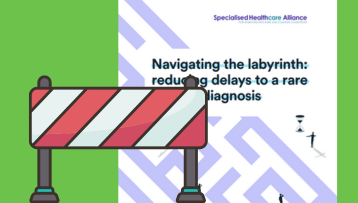
The announcement comes less than a month after the Scottish Medicines Consortium (SMC) recommended everolimus for patients with TSC-related epilepsy living north of the border using the same evidence base as NHS England.
In March 2018 NHS England consulted on draft guidance recommending the use of everolimus as an add-on treatment for people aged two years or older who have TSC-related seizures. The draft guidance stated: “We have concluded that there is enough evidence to consider making the treatment available.” Healthcare professionals and people living with TSC and their families were delighted with the draft guidance and responded positively to NHS England’s consultation.
Maxine Smeaton, Chief Executive of the Tuberous Sclerosis Association (TSA), the only UK charity that supports people affected by TSC, said: “NHS England’s own evidence-based review – underpinned by analysis from NICE – concluded that there is enough evidence to consider making everolimus available in England. Healthcare professionals and people living with TSC agreed during a public consultation.
“NHS England’s decision to ignore the evidence base and feedback from experts treating and living with TSC is disappointing beyond words. The difference that everolimus makes to the lives of people with TSC who have refractory epilepsy is unprecedented, and the TS community in England will be devastated by this news.”
TSC is a genetic condition that can lead to growths in various organs of the body, and it is estimated to affect 10,000 people across the UK. These growths may be referred to as benign tumours but they are not cancerous: when they cause problems it is mainly because of their size and where they are in the body. The organs most commonly affected are the brain, eyes, heart, kidney, skin and lungs.
Epilepsy is the most common neurological feature of TSC, affecting more than eight out of ten people living with the condition. More than 50 per cent of people with TSC who have epilepsy will not respond to standard anti-epilepsy medicines and may need an alternative form of treatment.
Ally Royall, 52, whose son Jack, 26 has TSC and refractory epilepsy, said: “I cannot believe that NHS England have done this. At 17 my son Jack was suffering multiple seizures daily, and was months away from death due to inoperable tumours in his brain. On his 18th birthday he was put on everolimus on a trial basis, and it has not only saved his life, but mine too as the strain of caring for him had left me on the verge of suicide on more than one occasion.”
Mother-of-two Ally, from Norwich, added: “I am disgusted that the powers that be have ignored all the evidence of just how life-changing this drug is and condemned hundreds of people in England to serious risk and wholly preventable suffering.”
Chris Kingswood, Consultant Nephrologist and Head of Research Strategy at the TSA, said: “This is absolutely not the decision we were hoping for. The availability of everolimus seriously decreases the risk to health and life that refractory epilepsy causes for people living with TSC. It is also disappointing that after all the charities and the research community work in collaboration with industry and the investment of millions of pounds in finding an effective treatment for this genetic disease that it will go unused in England.
“What this decision means is that if you have TSC and refractory epilepsy and are lucky enough to live in Scotland you are likely to have well controlled epilepsy, good health and a good quality long happy life. If you live in England you will continue to have frequent damaging severe seizures, poor health, a lower quality of life, and to live with the fear that you could die early by choking to death on your own vomit during a seizure.”
Maxine Smeaton added: “We know that this is the wrong decision. The TSA will continue to represent the views of people living with TSC and their families to get the right result for our community. We will continue to work with NHS England, the pharmaceutical company who make this drug, and the TSC community to highlight the need for this treatment and will ask NHS England to review this decision at its next Clinical Priorities Advisory Group (CPAG) meeting in November 2018.”
NHS England’s own impact assessment report (p26) estimates that the annual cost of providing everolimus to eligible adults and children living with TSC in England would be just under £60 million (£59,925,000).
Everolimus is a holistic treatment for people living with TSC. In addition to treating TSC-related refractory epilepsy, there are further benefits to patients including preventing high risk of kidney problems, lung problems and brain tumours (subependymal giant cell astrocytomas, or SEGAs)
Notes for editors:
1. Maxine Smeaton, Chris Kingswood and Ally Royall are available for media interviews by contacting the TSA on 07866 807720 / 07870 210308.
2. NHS England consulted on draft guidance recommending the use of everolimus for refractory focal onset seizures in England during March 2018. Details of the consultation can be found here: www.engage.england.nhs.uk/consultation/commissioning-policy-everolimus
3. NHS England has already issued advice to the NHS in England recommending the use of everolimus for TSC-related:
• kidney growths www.england.nhs.uk/commissioning/wp-content/uploads/sites/12/2016/06/b14x09-ps-everolimus-aml.pdf
• brain tumours www.england.nhs.uk/wp-content/uploads/2016/12/clin-comm-pol-16066P.pdf
4. The SMC’s advice on the adjunctive treatment of patients aged two years and older whose refractory partial-onset seizures, with or without secondary generalization, are associated with TSC can be found here: www.scottishmedicines.org.uk/media/3467/everolimus-votubia-final-may-2018-for-website.pdf
5. You can find more information about the TSA here: www.tuberous-sclerosis.org
6. The TSA is using the campaign hashtags #Everolimusforepilepsy #NHSEnglandwrongdecision #Wewontgiveup



























































































































